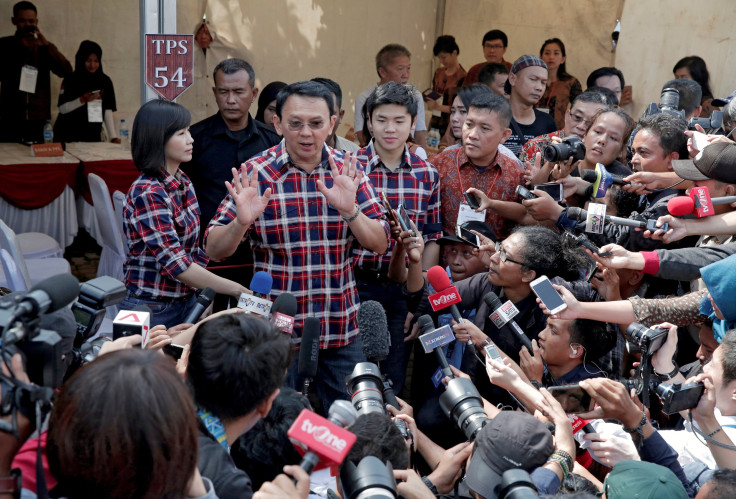Who Is Basuki Tjahaja Purnama? Christians And Muslims Battle In Indonesia Election

The election to become the governor of the capital city of Indonesia, which has been marred by racial undertones, was headed to a second balloting contest. Neither the incumbent Christian candidate nor his Muslim challenger appeared to win a majority after the first round of voting Wednesday.
Political analysts viewed the contest to head the municipal government in Jakarta as a test of religious tolerance in Indonesia, which has the largest Muslim population in the world. Islamic-led protesters have implored voters to shun a non-Muslim leader after Governor Basuki Tjahaja Purnama, who is Chinese Christian, was accused in December of insulting a verse in the Quran.
Basuki secured 43.08 percent of the votes Wednesday compared to his main rival, former Education Minister Anies Baswedan, who got 40.14 percent, based on a sample count of roughly 95 percent of the vote by the private polling firm SMRC.
Incumbent candidate for Jakarta governor Basuki Tjahaja Purnama mobbed by supporters at his election campaign HQ in Central Jakarta pic.twitter.com/SxPXRUT51l
— Saifulbahri Ismail (@saifulCNA) February 15, 2017
A candidate needs more than 50 percent of the votes in the first round to win the contest outright. Consequently, the second round of voting is expected to be held in April, according to Reuters.
Basuki has been involved in an ongoing criminal trial on the charge of blasphemy against Islam over allegedly insulting a verse in the Quran referred to as "Surah al-Maidah: 51" that implies Muslims should not be governed by non-Muslims. Basuki, who was raised by Muslim adoptive parents, has explained to the jury that his joke was meant to urge low information voters not to be deceived by Muslims using the verse to deter people from electing a non-Muslim leader.
Basuki, who’s campaign was endorsed by Indonesian President Joko Widodo's ruling party, has called the trial unfair and the result of political opponents trying to hinder his election. But anti-Chinese and anti-Christian slurs have been direct towards Basuki throughout the election campaign as mass protests in Jakarta demanded he be prosecuted or even hung for his comments, The New York Times reported Wednesday.
Despite blasphemy trial, Jakarta Governor Basuki Tjahaja Purnama holds slight lead as results come in. https://t.co/QtjxaTPf1o
— dpa news agency (@dpa_intl) February 15, 2017
Roughly 190 million Muslims live among Indonesia's 250 million citizens that also include minority Christian, Hindu and Buddhist populations.
Baswedan, who urged Islamic voters throughout his campaign not to support a non-Muslim leader, said his message in the second round would be more focused on politics.
Basuki's platform in the first round revolved around his efforts as governor to improve to curb traffic congestion and flooding in the capital.
"We will focus on programs, about jobs, about quality education, needs that are important and urgent for families and people in Jakarta," Baswedan told local reporters Wednesday.
© Copyright IBTimes 2024. All rights reserved.












